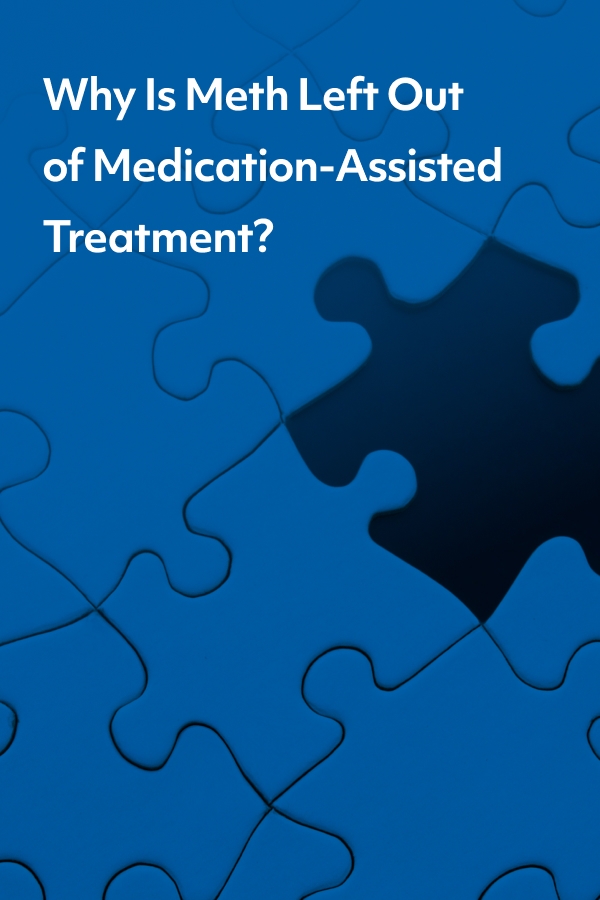When it comes to meth, there’s no MAT, no funding, and little hope
For being in the middle of an opioid epidemic, we sure did talk a lot about meth when I worked on the addiction medicine team at a local hospital as a recovery mentor. In fact, we talked about it all of the time. Depending on our patient list, we talked about it all day long. The collective brilliant brains of social workers, doctors, and mentors like myself couldn’t fix the meth problem for our dozens of suffering patients. Yet for something we all talked about endlessly, for an American tragedy we desperately were trying to help solve, it certainly felt like no one beyond the hospital walls was talking about it. After all, medications like buprenorphine and methadone were lifesaving medical interventions helping combat opioids and heroin addictions. But why aren’t there the same types of medications for meth and why don’t we talk about meth and the thousands of lives destroyed by it?
Lack of consensus
From what my creative (and certainly not medical) brain has learned, medication-assisted treatment (MAT) for meth is a very tricky thing. I’ve heard many doctors say something like stimulant replacement therapy (for example replacing meth with a prescribed stimulant) is too inconclusive in results and too controversial in concept to be taken seriously. They also fear that patients going for the extreme highs for meth may not respond to a more subdued and controlled medication. Some commonly prescribed stimulants, like Adderall for ADHD, are sometimes considered gateway medications to meth. Adderall is a combination of dextroamphetamine and amphetamine. It is considered habit-forming, and some believe that, when used recreationally, it can be as addictive and dangerous as meth itself. Lastly, research into medication for meth hasn’t uncovered a clear, defined treatment protocol. But more and more studies have been addressing this need since deaths from meth rose at a frightening rate in 2019. Recent research has provided encouraging avenues of treatment, but the FDA has not yet approved them for treating meth use disorder.
The danger of stigma
Then there’s the additional problem of the crippling stigma that goes along with meth. Mildly put, meth has a bit of an image problem. The reality is, we aren’t usually hearing about nice white ladies from upper-middle-class families dying from meth, like we do about opioids. When we hear meth, most people think of a long canceled tv show featuring desperate criminals; poor, uneducated folks; or the LGBT community. Meth, or so we’re led to believe, doesn’t affect our friends or neighbors and isn’t as lethal as heroin. For much of America, meth is out of sight and out of mind. A homeless man I supported in the hospital once remarked, “Nobody cares about people who use meth because we are all poor, homeless, or have mental illness.” It was hard to argue with him. We somehow forget the psychosis, the deadly heart problems, and the endless burden of meth use on our criminal justice and healthcare systems. As someone who struggled with meth in the past, I can say that it is absolute hell as an addiction. Anyone suffering from it deserves our help, stigma or not.
Hope for medication options
So what’s the answer? When it comes to meth, the key probably won’t be one answer but lots of answers. For example, cities like Portland, Oregon, and San Francisco are having clinical trials featuring micro-dosing of prescription stimulants and other drug combinations to see if they can crack the code. Some doctors are circling back around to a study from 2009 that reported ADHD medication dexamphetamine helped decrease meth use in study participants. Likewise, Naltrexone is currently being hailed as a possible MAT solution for meth users. In a 2019 report, NPR talked to doctors, psychologists, and patients who all had success using naltrexone to help with symptoms of meth withdrawal. This and other reports suggest that the combination of naltrexone with other medications, like the antidepressant bupropion (Wllbutrin,) can be helpful in treating meth use disorder. While the use of naltrexone to treat meth use disorder has yet to be approved by the FDA, it’s being seriously considered as a possibility.
Behavioral support that makes a difference
Next, there are a number of non-medication options that provide hope. The one I’ve seen work incredibly well for people struggling to quit meth is contingency management. For the uninitiated in recovery world lingo, contingency management is a simple system of rewards for goals met. For example, giving out coffee shop gift cards for each month a patient stays sober, or providing rewards like snacks and candy for negative drug tests. This may sound silly and a little like bribery, but studies show that the combination of rewards and therapeutic positive reinforcement really works on methamphetamine users. At the hospital, much of my job as a peer recovery mentor was encouraging the people I worked with to stay and complete a long course of antibiotics to treat infections caused by IV drug use. Promising and delivering little rewards for each week they stayed in the hospital gave them something to work towards and be proud of. These small treat make a reall difference in outcomes.
Access is vital
But the biggest answer for America’s meth problem is better access to treatment. Working with folks battling meth addiction on the streets and in hospitals, I’ve seen the devastation this epidemic is causing firsthand. There aren’t enough treatment beds, too many insurance barriers and a broken criminal justice system that all stand in the way of people wanting help. This means thousands of people who want help are unable to get it. This a mind-blowing and baffling truth for a rich country with endless resources. Consider how fast Washington acted to address the dangers of vaping. Yet it’s taken decades to get more treatment for people dying of substance use disorders. Much like other health epidemics such as the AIDS epidemic, our addiction crisis might have to be solved and pushed for by the people dying from it. Policy changes and political activism to increase treatment and reduce stigma will have to work side by side with medication interventions to bring about a solution for a meth nightmare currently spinning out of control.










